Mexico election: Security tops agenda for new president
- Published
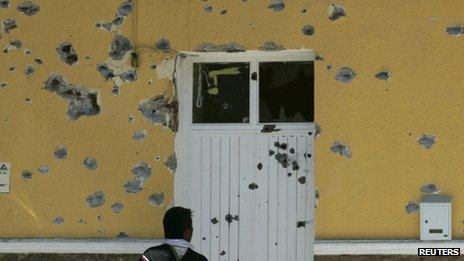
Attack on authority? Gunmen strafed this town hall in Jalisco state
Enrique Pena Nieto of the Institutional Revolutionary Party (PRI) is on course to win Mexico's presidential election, according to early official results.
The new president will not take office until December, but is set to find a full in-tray of key problems to be tackled.
Security and organised crime
By far the most high-profile issue in the new president's in-tray is security.
Mexico has experienced some of the worst drug-related violence of the 21st Century.
The outgoing administration of Felipe Calderon says that, given the escalating drug violence in 2006, they were faced with little alternative but to tackle the cartels with military force.
Government officials also point out the annual murder rate is lower than several other countries in the region, including Venezuela, Honduras and Brazil.
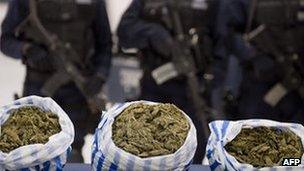
Marijuana, cocaine, heroin and synthetic drugs are all trafficked by the gangs
But the sheer brutality of the violence in Mexico sets it apart from other Latin American nations.
This year alone, there have been several massacres involving dozens of mutilated corpses.
Bodies have been suspended from bridges and severed heads dumped outside local government offices in ice-boxes, macabre events intended to sow fear among the local population.
Some of the gangs have evolved into vast criminal networks.
This is particularly the case with Los Zetas, originally formed of former military personnel from Mexico and Guatemala, who now control swathes of the north-east of the country.
The other main gang, the Sinaloa Cartel, is headed by the world's most wanted drug trafficker, Joaquin "Shorty" Guzman.
Tackling the cartels poses a huge challenge for the incoming president.
The new administration will have to decide early on whether to continue the current military strategy against the drug cartels or try an as yet undefined new approach.
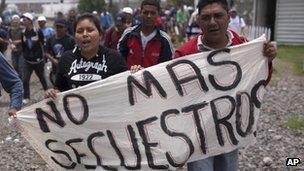
Kidnappings and extortion by drug gangs are on the rise
For security analyst Ana Maria Salazar, negotiating with the gangs is not an option.
"The sheer strength of these organisations makes it impossible... 'negotiate' means there would have to be some kind of consequence for breaking the agreements.
"And that would mean the government would have to become more violent than the cartels. The idea of a pact is obnoxious and - I think - impossible."
The next president will also need to bring greater pressure to bear on Washington to reduce the demand for drugs in the US and stem the flow of weapons south.
Tackling organised crime is clearly going to be a daunting task.
Impunity is still a massive problem, with an estimated 97% of drug-related murders going unpunished.
Economy
Gerardo Esquivel, an adviser to the World Bank and OECD, identifies three key economic issues.
"First, re-establish economic growth at a sustainable and higher level. Next, combat poverty, in which we've seen very poor results over recent years. And third, create greater employment opportunities, in particular for the young."
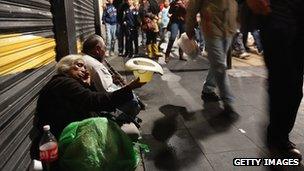
About half the Mexican population lives below the poverty line
Sergio Martin, chief economist at HSBC in Mexico, argues that Mexico's projected growth rate for 2012 - between 3% and 4% - is healthy, especially when compared with the US and most of Europe.
But Mr Esquivel believes the growth rate conceals a more worrying economic reality in Mexico.
"If we take into account that the economy fell heavily in 2009 and our recovery has involved very little formal employment and most of the jobs created are below the average wage, that's when the perspective becomes a little more critical," he told the BBC.
There is also the thorny issue of whether to privatise the state-run energy company Pemex.
It represents a potential income of tens of billions of dollars to the Mexican government, even if it just partially privatised.
But the state's ownership of Pemex is protected by the Mexican constitution and any plan to open it up to the private hands would be very tough to get through Congress.
Corruption
The current administration has tried to introduce new anti-corruption measures, including a public awareness campaign and streamlining certain government bodies.
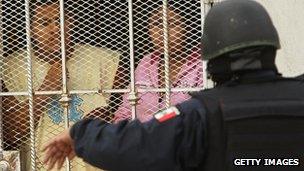
Faith in state institutions such as the police is shaky
Yet the televised debates during the election campaign highlighted how the issue continues to dominate the political discourse in Mexico.
Allegations were levelled against all four candidates and their parties. The mud-slinging ranged from long-forgotten political scandals to alleged family ties with tainted public figures.
"In the fiscal pact that Mexico has, the governors and mayors are totally unaccountable for the money they get (from central government)," says Dr Eric Magar, a political scientist at Mexico City's Autonomous Technological Institute (ITAM).
Dr Magar believes tackling corruption is a question of examining the role and autonomy of local and state authorities.
"States are supposed to justify how their money is used, but there is very little that Congress can do to actually verify the reports that come from (each) state. So that gives you big leverage to use these funds as you wish," says Dr Magar.
The drugs war has further complicated the issue of corruption, given that the drug lords have the funds to buy forces at will, he says.
Corruption is "ingrained in the system" with everyone either corrupting or corrupted.
The police and the judiciary in several states have been infiltrated by the drug cartels and many Mexicans have little or no confidence in public institutions such as the police.
"It is a big issue," says Dr Magar. "This is something which will take lots of political will to change."
Monopolies
Mexico's young people came out to the streets several times during the election campaign to voice their frustration at what they see as an elitist society and a monopolistic media.
The #yosoy132 campaign began as a student protest but gathered pace in the latter stages of the campaign, eliciting comparisons with the Indignados movement in Spain.
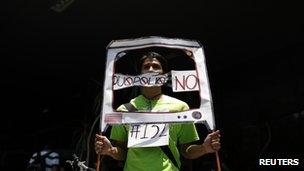
Monopolies and duopolies hold sway in some key sectors of the economy
The main focus of the protests were the PRI, the party which ruled Mexico for most of the last century.
But Dr Magar suggests all of the main parties would have a tough time breaking up the control of the most powerful individuals and families in Mexico.
He cites the example of the world's richest man, Carlos Slim, and his telecommunications empire.
"Going against (Carlos) Slim, for example, you require a big coalition to do that. He has so much grip and clout in so many areas, that you'd need a very strong, united coalition and it would still take decades."
In particular, the two main media outlets, Televisa and TV Azteca, have come in for the sharpest criticism by the protesters.
Many in the #yosoy132 movement are media-savvy, and say they are unwilling to accept any administration that ignores their calls for change.
Social fabric
Social psychologist Dr Andromeda Valencia believes there is a more pressing need than ever to rebuild the social fabric in Mexico.

The cult of Santa Muerte or Holy Death has spread in recent years, especially in crime-ridden communities
For families living under the threat of the drug violence in several states in the country, she says, the effect on young people has been deeply traumatic.
"If we let, on some level, violence inside our house, our home, and then we go outside into the streets and we see more violence", she says, "then the children have a very hard time understanding.
"They ask "is this normal? Is this the way that we should behave?"
Six years of fighting have seen the break-up of many communities and a new exodus to the relative calm of Mexico City.
The government has created some institutions to support affected communities and recently announced a fund to support victims' families. But there is criticism that such resources are inaccessible and bureaucratic.
The process of strengthening social cohesion in Mexico is not as well-defined as creating jobs, for example. But it is something which many sociologists now feel is critical.